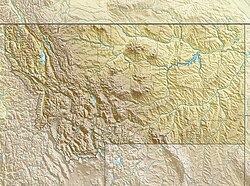| Mount Gould | |
|---|---|
 Mount Gould with eastern cliff face | |
| Highest point | |
| Elevation | 9,557 ft (2,913 m)[1] |
| Prominence | 1,953 ft (595 m)[1] |
| Parent peak | Mount Siyeh |
| Isolation | 3.13 mi (5.04 km)[2] |
| Listing | Mountains in Glacier County, Montana |
| Coordinates | 48°44′34″N 113°42′52″W / 48.74278°N 113.71444°W[3] |
| Geography | |
| Parent range | Lewis Range |
| Topo map | USGS Logan Pass |
| Geology | |
| Rock type | limestone, diorite |
| Climbing | |
| First ascent | 1920 by Frank B. Wynn, Harry R. Horn, Henry H. Goddard, and party |
| Easiest route | West Face (scramble/Class 3) |
Mount Gould (9,557 ft (2,913 m)) is a peak on the Continental Divide in Glacier National Park, Montana, United States.[4] It is the highest point of the Garden Wall, a distinctive ridge of the Lewis Range. It is most notable for its huge, steep east face, which drops 4,000 ft (1,220 m) in only one-half mile (0.8 km). This face provides a backdrop to Grinnell Lake, and is often photographed.
Mount Gould was named in 1887 by George Bird Grinnell for his hunting companion, George H. Gould, and the name was officially adopted in 1929 by the United States Board on Geographic Names.[5]
The first recorded[6] ascent of Mount Gould was in 1920, by Frank B. Wynn, Harry R. Horn, Henry H. Goddard, and party. They used the West Face route, which is the easiest and most commonly used route today. It starts from the Highline Trail, which skirts the west side of the peak, and involves some rock scrambling but no technical climbing.
Climbing the sheer East Face of Mount Gould is theoretically possible; however the brittle, loose nature of the rock in Glacier National Park makes the ascent highly technical, unpleasant, and dangerous.[citation needed]

- ^ a b "Mount Gould, Montana". Peakbagger.com. Retrieved June 12, 2018.
- ^ "Gould, Mount - 9,553' MT". listsofjohn.com. Retrieved 2021-08-10.
- ^ "Mount Gould". Geographic Names Information System. United States Geological Survey, United States Department of the Interior. Retrieved June 12, 2018.
- ^ Logan Pass, MT (Map). TopoQwest (United States Geological Survey Maps). Retrieved June 12, 2018.
- ^ Decisions of the United States Geographic Board, Place Names, Glacier National Park, Mont., US Government Printing Office, March 6, 1929, page 7.
- ^ Since access to the summit is nontechnical, an earlier ascent, and perhaps a much earlier Native American ascent, is possible.
